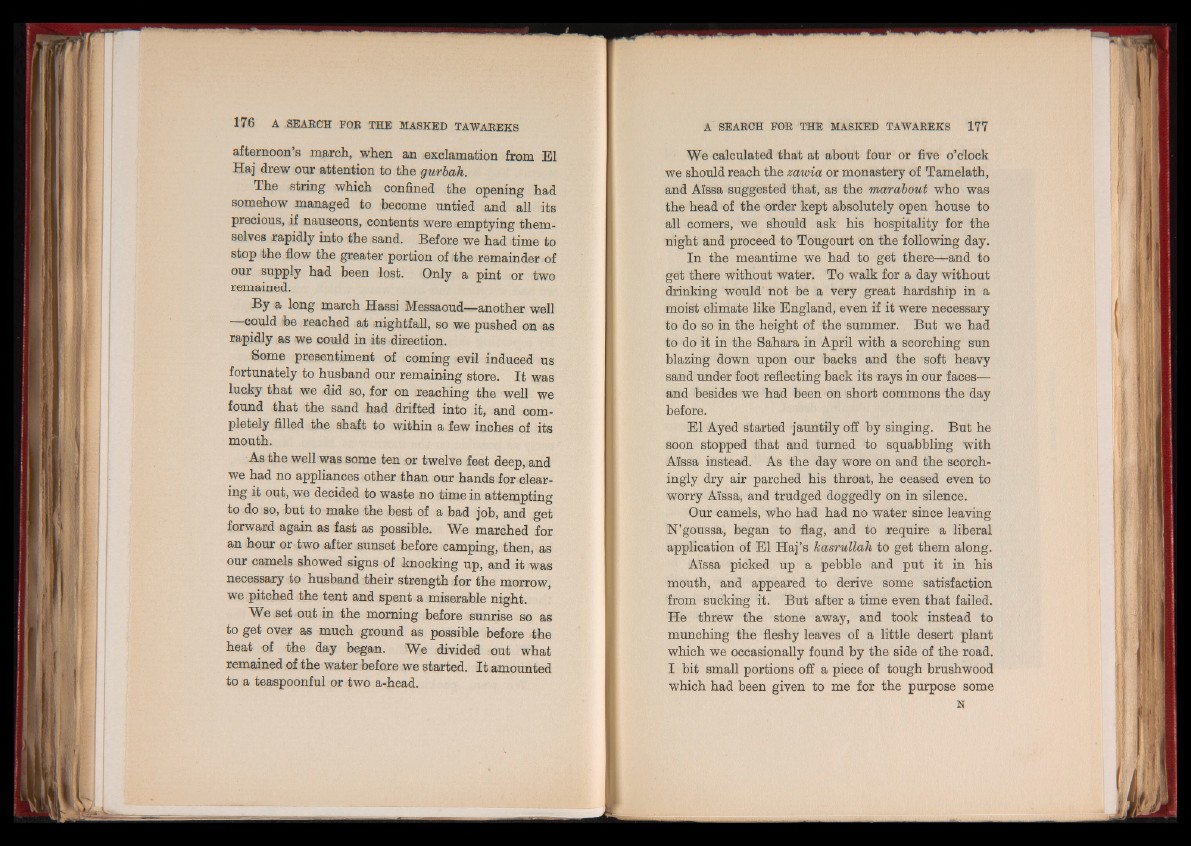
afternoon’s march, when an exclamation from El
Haj drew our attention to the gurbah.
The string which confined the opening had
somehow managed to become untied and all its
precious, if nauseous, contents were emptying themselves
rapidly into the sand. Before we had time to
stop the flow the greater portion of the remainder of
our supply had been lost. Only a pint or two
remained.
By a long march Hassi Messaoud-—another well
could be reached at nightfall, so we pushed on as
rapidly as we could in its direction.
Some presentiment of coming evil induced us
fortunately to husband our remaining store. It was
lucky that we did so, for on reaching the well we
found that the sand had drifted into it, and completely
filled the shaft to within a few inches of its
mouth.
As the well was some ten or twelve feet deep, and
we had no appliances other than our hands for clearing
it out, we decided to waste no time in attempting
to do so, but to make the best of a bad job, and get
forward again as fast as possible. We marched for
an hour or-two after sunset before camping, then, as
our camels showed signs of knocking up, and it was
necessary to husband their strength for the morrow,
we pitched the tent and spent a miserable night.
We set out in the morning before sunrise so as
to get over as much ground as possible before the
heat of the day began. We divided out what
remained of the water before we started. It amounted
to a teaspoonful or two a-head.
We calculated that at about four or five o’clock
we should reach the zawia or monastery of Tamelath,
and Aissa suggested that, as the marabout who was
the head of the order kept absolutely open house to
all comers, we should ask his hospitality for the
night and proceed to Tougourt on the following day.
In the meantime we had to get there—and to
get there without water. To walk for a day without
drinking would not be a very great hardship in a
moist climate like England, even if it were necessary
to do so in the height of the summer. But we had
to do it in the Sahara in April with a scorching sun
blazing down upon our backs and the soft heavy
sand under foot reflecting back its rays in our faces—
and besides we had been on short commons the day
before.
El Ayed started jauntily off by singing. But he
soon stopped that and turned to squabbling with
A'issa instead. As the day wore on and the scorch-
ingly dry air parched his throat, he ceased even to
worry Aissa, and trudged doggedly on in silence.
Our camels, who had had no water since leaving
N’goussa, began to flag, and to require a liberal
application of El Haj’s Jcasrullah to get them along.
Aissa picked up a pebble and put it in his
mouth, and appeared to derive some satisfaction
from sucking it. But after a time even that failed.
He threw the stone away, and took instead to
munching the fleshy leaves of a little desert plant
which we occasionally found by the side of the road.
I bit small portions off a piece of tough brushwood
which had been given to me for the purpose some
N